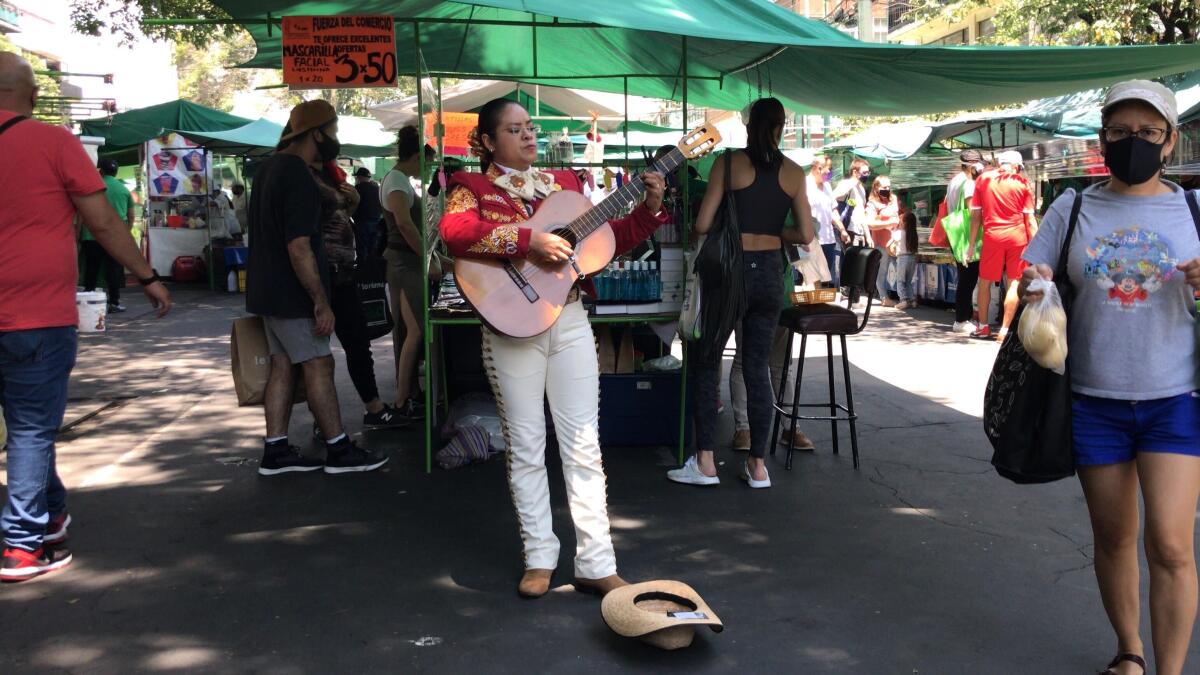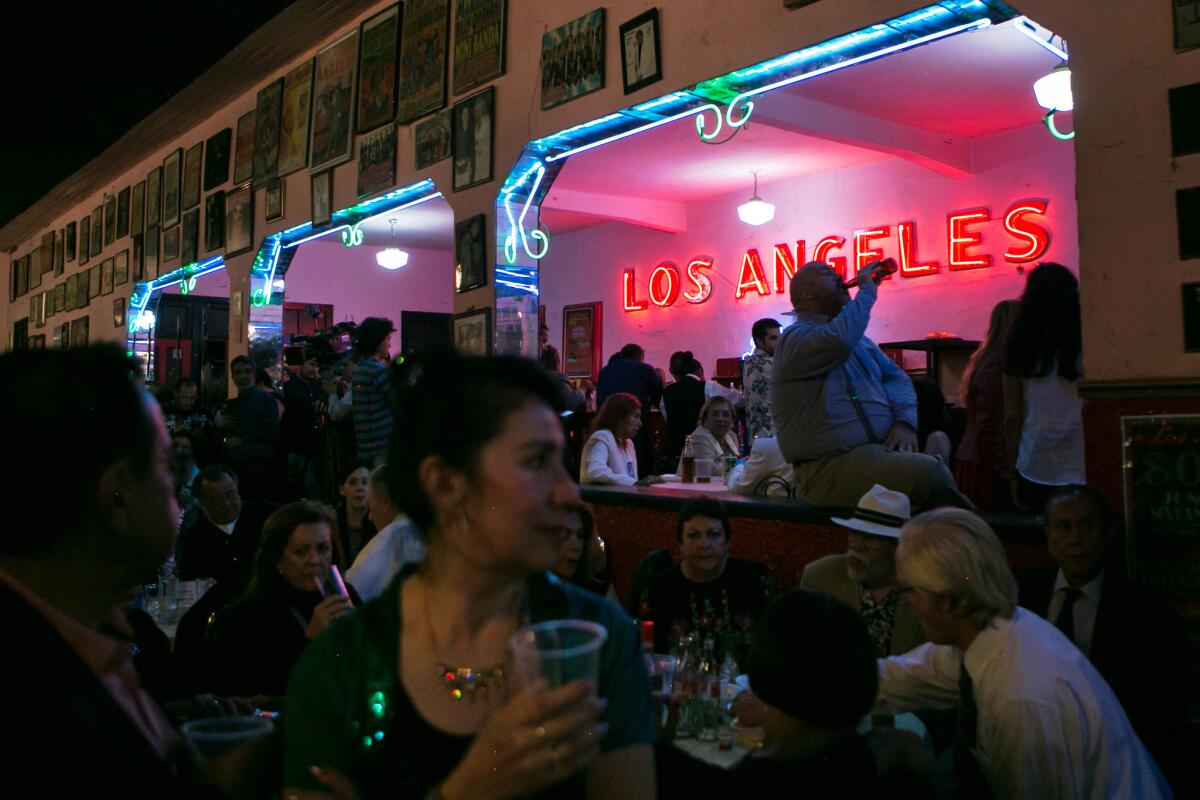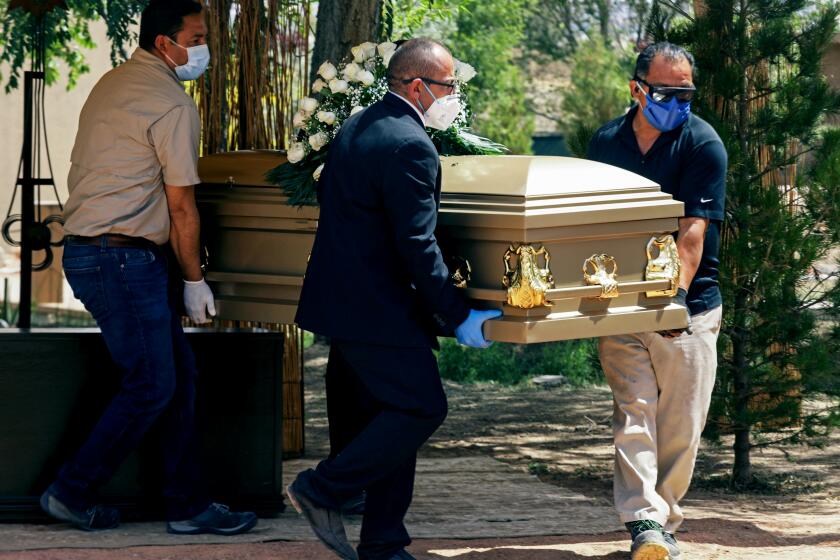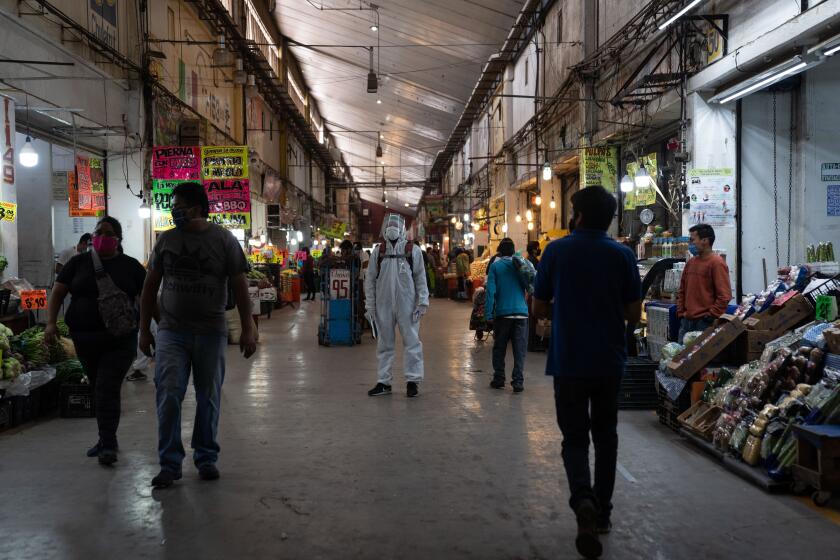Another coronavirus casualty: the Mexican fiesta

- Share via
MEXICO CITY — In the old days, back when people could gather in large groups without fear, mariachi singer Nancy Velasco was the life of the fiesta.
She and her band would announce their arrival at social events in and around Mexico City with an eruption of trumpets and violins. Guests would go wild, embracing and sometimes weeping as they sang along.
But parties, like so many traditions taken for granted before the COVID-19 pandemic, are now on hold indefinitely here.
It may seem like a trivial loss in a country where COVID-19 has killed more than 44,800 people and the attendant recession has eliminated well over a million jobs.
In cities across Mexico, morgues are full and funeral homes are jammed but nobody knows for sure how many people have died in the COVID-19 pandemic.
But in Mexico, fiestas are much more than just a good time. Elaborate quinceañeras, weekend carne asadas, religious festivals honoring patron saints — all are critical and often cathartic rituals that bind family and community.
Their absence is deeply felt amid the stress of the pandemic.
“We’re very social people,” said Velasco, 37, who has not performed at a party since March. “Everything is sad and tense.”
Some have tried to adapt to the new reality, including leaders in Oaxaca state, who celebrated the region’s Guelaguetza festival entirely online this month in place of colorful parades in the streets.
But social distancing is antithetical to most celebrations here, where guests greet one another with a customary kiss on the cheek and nearly everyone — even children — takes to the dance floor.
“The whole point is to be close,” said Miguel Nieto, who owns Salon Los Angeles, Mexico’s oldest dance hall. “That becomes dangerous during a pandemic.”

His club, typically packed with people doing the mambo or the cha-cha in front of a live orchestra, closed its doors in March. In eight decades of operation, the only other time it has gone dark was for two weeks during the H1N1 flu outbreak in 2009.
Nieto hopes to resume business as soon as Mexico City enters its final stage of reopening, when bars and nightclubs will be given the green light. But it all depends on whether he can stay afloat until then.
He recently launched a fundraising campaign. The first to donate was an older couple who told him they could not imagine life without their weekly dance date.
They said: “If it dies, a part of us will die too.”
If the club reopens, it will be with strict new rules, Nieto said. Unless dancers arrive with partners, they will be asked to boogie on their own, and at least six feet apart from everybody else.

Others have been exploring workarounds to keep the party alive.
Some DJs have begun setting up equipment on their rooftops and encouraging neighbors to gather on the tops of other buildings nearby, a kind of a floating fiesta that allows people to celebrate from a safe distance.
DJ Marisol Mendoza Gómez now works from the safest distance: online.
She made her name performing at sonideros, street parties in working-class neighborhoods known for their elaborate light shows and delirious mash-ups of cumbia and electronic music.
After nearly every party she had lined up this year was canceled, she had no choice but to start streaming her sets, asking for donations.
Toward the end of one recent performance, a young woman who was watching from home started to cry.
“It’s been so long since I’ve danced,” she explained.
Mendoza decided to keep playing. “People need music,” she said.
The daughter of a sonidero DJ, Mendoza grew up accompanying her father to parties, guarding his prized record collection. It was a magical environment, she said, a place where people who worked hard during the week could come and for a brief moment forget their troubles.
Many of Mexico’s border factories are flouting orders to suspend operations, worsening the spread of the coronavirus.
Mexican writer Octavio Paz, in his famous essay “The Labyrinth of Solitude,” described the fiestas as crucial to Mexican identity and the functioning of society.
“Any occasion for getting together will serve, any pretext to stop the flow of time,” he wrote.
Some people have not been able to resist the lure of the fiesta.
In the Gulf Coast state of Veracruz, residents in Xico this month defied local orders to stay inside on the day the town celebrates its patron saint, Santa Maria Magdalena. Photos on social media showed large numbers of people dancing in the streets without masks.
It it too early to see whether the celebration led to a rise in infections. But authorities in the northern state of Nuevo Leon blamed a large clandestine wedding party in June for a major outbreak of the virus.
For the most part, people are canceling their events. Baptisms and graduations are being celebrated with just immediate family. Quinceañeras are being put off until 2021, when instead of celebrating a young woman’s 15th birthday, they will be rechristened “Sweet 16” parties.
Erika Gomez Regalado, 30, was set to be married May 23. She and her fiance had invited 250 guests — a modest number by Mexican standards — and had picked out flowers, rings and the menu.
After the couple both lost work, they decided to postpone the wedding indefinitely.
“We can’t do it because of the pandemic but also because of the economy,” she said.
Anxieties are running high — the International Monetary Fund forecasts Mexico’s economy will contract 11% this year, more than anywhere else in Latin America. The United Nations estimates that half a million businesses could close here in the next six months.
Mexican President Andrés Manuel López Obrador is one of the world’s most powerful leftists. So why is he drawing comparisons to Margaret Thatcher?
Velasco, the mariachi, lost her car insurance and phone service because she couldn’t pay her bills.
She once toured Europe and has performed on some of Mexico’s biggest stages. Now she sings for tips on public buses and street corners. She worries constantly about how she and her wife will feed their young son.
“If there aren’t parties, if people don’t want music, how will I survive?” she said. “I’m not going to stand here with my arms crossed and wait for work to fall out of the sky.”
She is considering other careers — anything to put food on the table. But she knows she would miss her favorite thing about being a mariachi: bringing people together.
On a recent sunny morning, she stationed herself in the middle of an open-air market and began strumming her guitar. Masked shoppers scurrying by slowed to listen as she sang a string of ballads that showed off her operatic vibrato.
Some recorded video of the performance to send to family or friends. Others swayed by themselves. One by one, they dropped coins into her guitar case.
More to Read
Sign up for Essential California
The most important California stories and recommendations in your inbox every morning.
You may occasionally receive promotional content from the Los Angeles Times.














